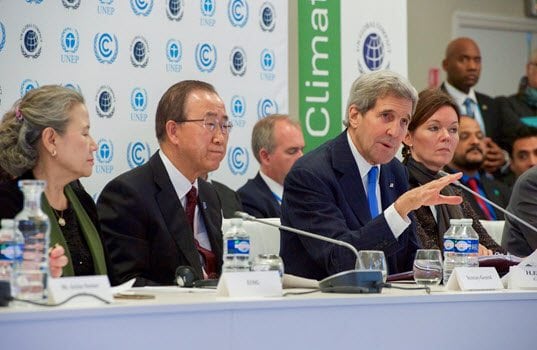I admit it. I was wrong. In THIS policy brief I noted the then upcoming Paris climate talks—Conference of the Parties 21—would likely fail: If history is any indication, the talks will go nowhere as the developing world fights over how big a check the Western economies must write to appease their requests for climate justice, while China and India (the nations most impacting long-term carbon production) ignore any commitments of substance. They have more nationally-focused energy policies that values jobs and economic growth.
Instead, as U.N. Secretary General Ban Ki-moon triumphantly announced: “For the first time, we have a truly universal agreement on climate change.” On Dec. 12, 2015, an extraordinary 195 nations (or at least the political leadership of those nations) came together in Paris to reach this accord. Even China, which has long indicated an unwillingness to damage its economy over CO2 reduction, got on board.
Of course, in order to get that historic agreement the provisions are entirely voluntary and there are no enforcement or compliance mechanisms. As Secretary of State John Kerry noted in a Fox News interview, a binding agreement with mandatory requirements would have to be approved by the Senate as a treaty, and that simply was not going to happen.
Essentially, each country sets an individual goal to reduce carbon emissions, and then works to meet that goal. The Obama Administration fell back on its established target to reduce emissions 26%-28% (compared to 2005 levels) by 2025. The long-term goal is 80% by 2050.
There is also a voluntary commitment to the climate sin tax, or Green Climate Fund, that has pushed for $100 billion per year by 2020 to be redistributed to the developing world. This is ostensibly to help them with their CO2 reducing activities and to mitigate the negative economic impacts that will arise from those activities.
Failure, with either emission reductions or contributions to the climate fund, will only be punished in the court of world opinion.
Although the voluntary requirements are economically significant, even then the outlined goals will come up short of what climate change activists say would be required to fend off whatever the ravages might be of man-made global warming a century from now. For example, the previous goal to reduce the increase in CO2 to 2 degrees Celsius by 2100 was reduced to 1.5 degrees Celsius. However, the signatories are expected to ratchet up their individual reduction goals every five years.
What has been insightful from this extravagant, carbon-intensive meeting is the clarification that the core leadership, and not just the fringe, of the climate change movement has no room for an “all of the above” strategy where energy is concerned. The goals themselves made that obvious. As UKs Daily Mail covered in THIS article, UK leaders have stated a firm commitment to make the voluntary goals happen. As the news outlet noted, say goodbye not just to coal-fired electricity but to gas cooking and heating:
Bob Ward, who is policy director at the Grantham Research Institute of Climate Change, said that to meet Britain’s commitments the days of cooking with gas were numbered.
He said: ‘The only possible use of fossil fuels that will continue is if they are used to generate electricity, but this will only happen if the carbon dioxide they create is captured and stored.
‘Gas cookers will be phased out, probably as soon as possible. I suspect manufacturers will simply stop making them.’
He added that in years to come some form of carbon tax putting up the cost of gas is inevitable – which will make electric cookers much cheaper than their gas rivals.
CCC chief executive Matthew Bell said: ‘For something like heating, by 2050 gas will be playing a much more limited role and a range of other technologies will have taken its place, meaning low-carbon sources of warmth – heat pumps and so on.’
Obviously, meeting the voluntary goals would come with some serious lifestyle adjustments for the common folk (though it’s not hard to imagine that those with sufficient personal resources would see little, if any, quality-of-life changes).
With that in mind, the next president and the legislative branch will have to support these policies through legislative action or, as has been the case with the Obama Administration, though the federal agencies using regulation and rule-making (with the subsequent lawsuits). Similarly, Obama’s initial efforts, such as the Clean Power Plan, would have to remain unopposed by future leadership. Such actions would be increasingly dependent upon the support of the American people, especially as any negative ramifications become apparent.
Here are the highlights (directly from the reports) of some recent polls on climate change to help predict how much or how little of these voluntary commitments will be supported. As this is an editorial, open to bias on the part of the editor, feel free to visit the links for the full polling results. They are broadly insightful for those interested (though you might also note some editorial license at the sources in framing the results).
PEW Research Center: Global Concern about Climate Change, Broad Support For Limiting Emissions
By Bruce Stokes, Richard Wike and Jill Carle
• In the U.S., 45% believe global climate change is a very serious problem. One-in-four Americans do not consider climate change to be a serious problem, one of the highest shares of all the nations surveyed.
• Americans are among the most likely to believe that the effects of climate change are a long way off. While 41% report that climate change is already harming people around the world, 29% believe that it will not harm people for many years or may never harm people, the greatest sentiment of this kind in any nation polled.
• Nowhere is this differential more striking than in China, the nation responsible for the greatest annual release of CO2 into the atmosphere. About seven-in-ten Chinese (71%) support an international treaty to curtail emissions, yet just 18% of the public expresses intense concern about climate conditions – a 53 percentage point differential. These results suggest the Chinese government has general public support for its recent initiatives to deal with global warming even though the Chinese people are not intensely concerned about global warming.
• Roughly two-thirds (69%) of Americans favor Washington agreeing to a multilateral commitment to limit the burning of pollutants such as coal, natural gas or petroleum. This represents significantly more than the 45% of Americans who see global warming as a very serious problem. But this general support for taking action masks significant differences in the U.S. over signing an international climate accord. Fully 85% of Americans ages 18 to 29 back such a deal, while just 60% of people ages 50 and older agree. Roughly eight-in-ten Democrats (82%) favor limiting greenhouse gas emissions. But only half of Republicans concur.
• There is no such uncertainty about the sentiment of American and Japanese publics, both of which are indisputably wealthy by global standards. The U.S. economy is the second-highest contributor of annual CO2 emissions. But only four-in-ten Americans say rich nations should do more to address climate change than developing countries, while half of U.S. respondents say developing countries should do just as much. Despite partisan differences over many climate-related issues, more than half (54%) of both Democrats and Republicans believe that the burden of adjustment should be equally shared by both rich and poor nations.
Read more HERE.
ABC News/Washington Post poll, Nov. 30 2015
• As things stand, a new low, 47 percent, say the federal government should do more than it is doing now to try to deal with global warming, down from a high of 70 percent under the Bush administration eight years ago. This likely reflects increased action on the issue under the Obama administration; indeed more, 32 percent, say the government is doing the right amount, up 11 points. Many fewer say it’s doing too much – 18 percent, also up 11 points.
• It finds that 63 percent of Americans see climate change as a serious issue, with 52 percent saying it’s very serious. Those numbers have declined by 6 and 5 points, respectively, from an ABC/Post poll in June 2014. Thirty-six percent say climate change is not a serious problem at all, up 7 points. In terms of change over time, the decline in those wanting the government to do more is spread evenly across the political spectrum. However, compared with 2007, Democrats are 17 points more apt to say the government is doing the right amount; Republicans and independents, respectively, are 19 and 13 points more likely to say it’s doing too much.
Read more HERE.









